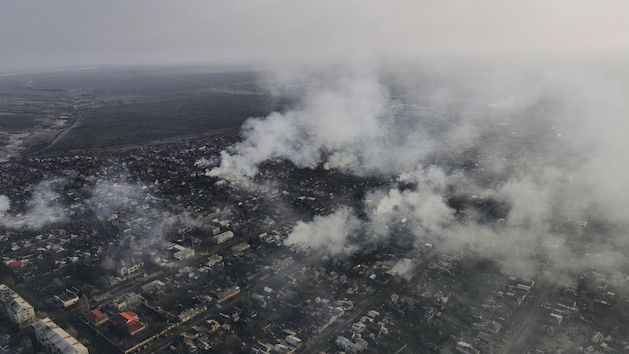Most of the once 70,000 residents of Bakhmut have long since fled. The city has been fiercely fought over for months, and most of the buildings have been destroyed. After capturing the nearby town of Soledar, more and more people decide to flee.
“When you go into the yard, bullets whistle around your ears,” says Olena Morosowa. For months, the 69-year-old held out in the fiercely contested Bachmut. But in view of the Russian troops approaching, Morosowa decided on Thursday to leave the eastern Ukrainian city. “My hands are shaking, I don’t have the strength to endure it all anymore,” she says.
Her son begged her to leave, Morosowa says. She sits in a relief center with the few belongings she was able to take with her, awaiting evacuation.
Most of the once 70,000 residents of Bakhmut have long fled, only a few thousand live in cellars, dependent on outside help. The fighting has been grueling for months, particularly on the eastern side of the Bakhmutka River, which bisects the city.
According to their own statements, in the past few days the Russian armed forces have advanced further to Bakhmut and captured the town of Soledar, 15 kilometers away. “Two weeks ago I thought about leaving, but I couldn’t decide,” says Morosowa. “Now we know that the Russians are already at the city limits, not far from us. We don’t want them invading our lives.”
More and more people are now deciding to flee, says Tetjana Scherbak, who works as a volunteer for an aid organization in Bakhmut. “People stayed as long as they had a home,” says the 51-year-old. “But now the attacks have increased, many houses have been destroyed. And it’s winter.”
Fleeing in the midst of the shelling is risky. Morosova, together with her neighbor, set out under cover of darkness when the bombardment subsided to the eastern part of Bakhmut. They packed their bags on handcarts, pulled them over the makeshift bridge towards the city center, where they stayed at the aid center.
“We had already prepared our things for a departure a month ago,” says Morosowa. But she couldn’t bring herself to leave. “I’m old – it’s a shame to leave the house and everything else.”
Natalia and her mother Valentyna also left the east of the city on Thursday with their cat. “We stayed as long as it was bearable. Yesterday it was said that Ukrainian forces had left Soledar, and Soledar is very close to us,” says 73-year-old Valentyna.
They should have seen civilians living across the street being evacuated behind Russian lines, Natalia says. Her own family was divided by the war. She separated from her husband “for political reasons” because he sided with the Russian occupiers.
Having to leave her hometown breaks Natalia’s heart. And Valentyna wonders what condition she will find her home and shop in when she returns one day. “I don’t know what I’ve lived for 50 years,” she says. “I have to start from scratch.”















